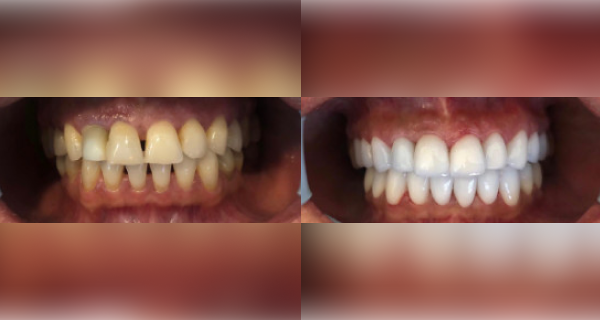How Long Do Veneers Last?
When it comes to veneers, two recurring questions are, 'how long do veneers last?' and 'are veneers permanent?' Typically, veneers last between five to 15 years depending on the type of material used to create them, and, although long-lasting, veneers are not permanent, as they need to be replaced. But, the procedure carried out to fit them is irreversible. It involves the shaving down your natural teeth and the application of bonding cement to secure the veneers onto them.
The durability and permanence of this dental treatment have come a long way in recent years. Technological developments involved in the creation and application of veneers have allowed them to become a more permanent solution than they once were.
With that being said, the durability of veneers can vary from patient to patient, depending on a few important factors. To look into this in more detail, we’ve created this dedicated article, addressing the question of 'how long do veneers last?' as well as outlining some of the important aspects which can have an effect on this.
Interested in Veneers? Find the Right Specialist at a Fraction of the Cost
Qunomedical only lists dental clinics and dentists that have been thoroughly vetted with quality and affordability in mind. Contact us for your 100% free, non-binding assessment.
What Are Veneers? A Brief Overview
Keeping things simple, a veneer is a thin shell that is bonded to the front surface of your tooth. Each veneer is individually crafted and can be made from either ceramic (often referred to as porcelain) or composite resin materials. This dentistry treatment aims to give your smile a fresh, natural-looking appearance, covering any damaged or discoloured teeth. This can be extremely effective, although, as with any treatment, there are pros and cons to be considered before having veneers fitted.

The price of veneers has steadied over recent years. But, overall cost is dependent on how many you have fitted, the specific type you choose, and where you decide to get your veneers. Travelling abroad can be more cost-effective, with many dental clinics overseas offering affordable packages for eight or 16 veneer packages for example. These allow you to have multiple veneers created and fitted in a single trip.
How Long Do Veneers Last?
As a general rule, traditionally-crafted veneers usually last between 10 to 20 years. Of course, this durability varies depending on a variety of different factors, including the material used. Typically, you’ll need to have your veneers replaced after around 15 years. But which material lasts longer and why? Below, we’ve outlined the durability of the two main types in more detail.
How Long Do Composite Veneers Last?
Composite veneers are a quick and affordable option. Made from specially created resins, composite veneers can be crafted in less time than their porcelain counterparts. They’re also cheaper to make and tend to require less drilling of the teeth during the fitting stage. When it comes to durability, composite veneers usually last for around five to 10 years. They can be more susceptible to staining than porcelain veneers and may not always provide as natural-looking results. However, for those looking for a faster, budget-friendly option, composite veneers are a good choice.
How Long Do Porcelain Veneers Last?
Porcelain veneers are strong and sturdy and have been the most popular option among past patients. Although they take longer to create than composite veneers, they usually look more natural, with better light reflection and greater resistance to staining. Porcelain veneers are also more expensive than composite, but they usually perform better when it comes to durability. The typical lifespan for porcelain veneers is around 10-15 years. While the material itself is fairly fragile, once bonded to the tooth, porcelain veneers are a lot stronger than composite, justifying their higher price tag.
Are Veneers Permanent?
In short, veneers are not considered a permanent dental solution. The main reason for this relates to their durability and the fact that they have to be replaced after around 5-15 years, depending on the material that’s used. While veneers aren’t permanent, they are still a long-lasting, irreversible dental treatment. The process of fitting them involves the shaving down of enamel on the natural teeth and it’s this process that cannot be reversed. However, when it comes to replacing old veneers with new ones, this shaving down process doesn’t need to be repeated again.
Factors Affecting Durability and Permanence
Now that we’ve addressed the questions of “how long do veneers last?” and “are veneers permanent?” it’s important to look into some of the factors that can have an effect on these. Keeping these factors in mind when it comes to your own veneers will help you to get the most from your money, as well as helping to ensure that your teeth remain healthy.
1. Material Used
As previously mentioned, the material that your veneers are made from will likely have a big impact on how long they last. The cheaper option, composite veneers, have a lifespan of around 5-10 years, while the slightly more expensive porcelain veneers should last between 10-15 years.
2. Choosing a Highly Experienced Dentist
To ensure that your veneers can have the longest possible lifespan, it’s important to only choose from dentists who are well-trained and highly experienced in the field of cosmetic dentistry. Poorly fitted veneers — or ones that are badly made — will not last as long as those fitted by a specialist dentist at a high-quality clinic. While you may initially pay more at a reputable clinic, this cost will be less than having to have your veneers fitted twice because of a poorly performed procedure the first time.
3. Maintaining Good Oral Hygiene
After you’ve had your veneers fitted, it’s important to maintain good oral hygiene to help to prolong their lifespan. As with any natural teeth, veneers need to be kept clean to keep their natural-looking appearance and avoid staining. To do this, we recommend a good brushing technique combined with a non-abrasive toothbrush to ensure that the surface of the veneers isn’t damaged by the cleaning. Your dentist may also suggest wearing a nightguard to give your veneers some extra protection, especially if you tend to grind your teeth while you’re asleep.
4. Regular Dentist Visits
As well as maintaining good oral hygiene at home, it’s important to keep up your regular dentist appointments after you’ve had veneers fitted. Try to make sure that you’re visiting at least twice a year, for cleanings and general check-ups. This will help to keep your veneers pristine for as long as possible.
5. Avoiding Using Your Teeth as Tools
Similarly to natural teeth, veneers are vulnerable to cracks and chips. So, it’s important to take care when it comes to hard foods. As well as this, try to avoid chewing on solid objects like pens and remember that your teeth aren’t a pair of scissors! Using them to open packaging, for example, can damage your veneers and might mean having to have them replaced.
Getting Started With Your Veneers
Ready to get started with your veneers journey? Contact us and one of our Patient Managers will be in touch to help. Whether you decide to book a treatment or not, we offer a 100% free, non-binding assessment. Your Patient Manager will then be able to provide you with information on high-quality, affordable treatment options, based on criteria that matter to you.
While high-quality specialists can certainly be found in the UK, some of the most popular dentists are based at reputable dental clinics abroad. Dr. Mert Yuce, DDS, PhD for example, is a specialist in cosmetic dentistry and dental implantology. Based at the internationally-renowned Dentalglobal clinic in Istanbul, Dr. Yuce has over 14 years of experience, during which he’s performed thousands of successful treatments.
Another popular choice is Dr. Laszlo Farago, DDS. Specialising in dental prosthesis since 2014, he’s well-respected within his field and is a member of the prestigious Hungarian Medical Chamber. When it comes to veneers, Dr. Farago offers unique eight, 16, or 20 veneer packages that include accommodation arrangements and ground transfers for patients travelling from abroad.
Sources:
Camillo D’Arcangelo (2012): 'Clinical evaluation on porcelain laminate veneers bonded with light-cured composite: results up to 7 years.' Last visited 8.12.2022.
Arcelino Farias-Neto (2015): 'Esthetic Rehabilitation of the Smile with No-Prep PorcelainLaminates and Partial Veneers.' Last visited 8.12.2022.
B.T. Rotoli (2013): 'Porcelain Veneers as an Alternative for Esthetic Treatment: Clinical Report'. Last visited 8.12.2022.
Disclaimer
The information in this article is for educational purposes only and does not replace medical advice. Always consult your doctor before starting any treatments.

Patient manager
Frieda
Your personal Patient Manager
Let's talk
Still unsure? Feeling overwhelmed? Talking to a real person can give you the guidance and reassurance needed. You don’t have to do it alone. Let’s find the right doctor together.
